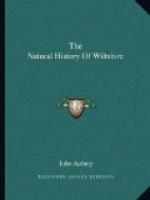A plaster of honey effectually helpeth a bruise. (From Mr. Francis Potter, B. D., of Kilmanton.) It seemes to be a rational medicine: for honey is the extraction of the choicest medicinal flowers.
Mr. Butler of Basingstoke, in Hampshire, who wrote a booke of Bees, had a daughter he called his honey-girle; to whom, when she was born, he gave certain stocks of bees; the product of which when she came to be married, was 400li. portion. (From — Boreman, of Kingston-upon- Thames, D.D.)
Mr. Harvey, at Newcastle, gott 80li. per annum by bees. (I thinke Varro somewhere writes that in Spaine two brothers got almost as much yearly by them.- J. Evelyn.) Desire of Mr. Hook, R.S.S. a copie of the modelle of his excellent bee-hive, March 1684-5; better than any yet known. See Mr. J. Houghton’s Collections, No. 1683, June, where he hath a good modelle of a bee-hive, pag. 166. Mr. Paschal hath an ingeniouse contrivance for bees at Chedsey; sc. they are brought into his house. Bee-hive at Wadham College, Oxon; see Dr. Plott’s Oxfordshire, p. 263.
Heretofore, before our plantations in America, and consequently before the use of sugar, they sweetened their [drink, &c.] with honey; as wee doe now with sugar. The name of honey-soppes yet remaines, but the use is almost worne out. (At Queen’s College, Oxon, the cook treats the whole hall with honey-sops on Good Friday at dinner. — Bishop tanner.) Now, 1686, since the great increase of planting of sugar-canes in the Barbados, &c. sugar is but one third of the price it was at thirty yeares since. In the time of the Roman Catholique religion, when a world of wax candles were used in the churches, bees-wax was a considerable commodity.
To make Metheglyn:-(from Mistress Hatchman. This receipt makes good Metheglyn; I thinke as good as the Devises). Allow to every quart of honey a gallon of water; and when the honey is dissolved, trie if it will beare an egg to the breadth of three pence above the liquor; or if you will have it stronger putt in more honey. Then set it on the fire, and when the froth comes on the toppe of it, skimme it cleane; then crack eight or ten hen-egges and putt in the liquor to cleare it: two or three handfulls of sweet bryar, and so much of muscovie, and sweet marjoram the like quantity; some doe put sweet cis, or if you please put in a little of orris root. Boyle all these untill the egges begin to look black, (these egges may be enough for a hoggeshead,) then straine it forth through a fine sieve into a vessell to coole; the next day tunne it up in a barrell, and when it hath workt itself cleare, which will be in about a weeke’s time, stop it up very close, and if you make it strong enough, sc. to carry the breadth of a sixpence, it will keep a yeare. This receipt is something neer that of Mr. Thorn. Piers of the Devises, the great Metheglyn-maker. Metheglyn is a pretty considerable manufacture in this towne time out of mind. I doe believe that a quantity of mountain thyme would be a very proper ingredient; for it is most wholesome and fragrant [Aubrey also gives another “receipt to make white metheglyn,” which he obtained “from old Sir Edward Baynton, 1640.” I have seen this old English beverage made by my grandmother, as here described.-J. B.]




